
Itching and many accompanying troubles can be caused by a huge amount reasons. To accurately establish the source, it is best, of course, to visit a doctor, but this is where the problem arises - which specialist should I make an appointment with?! Or go to everyone in a row - an inspection is never superfluous! Let's figure out what the reasons are and which doctor should be visited.
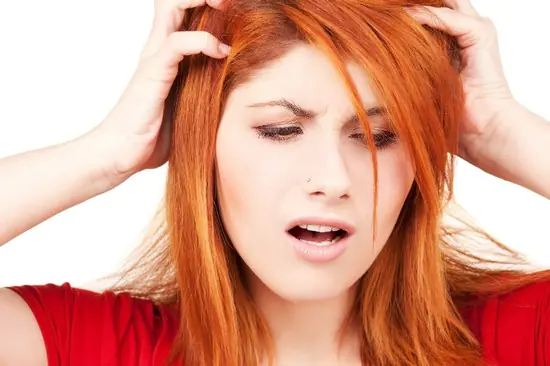
For severe, persistent itching of the scalp Necessarily consult a doctor! Don't delay! The sooner you contact, the less consequences there will be!
Probable Causes
- Seborrhea, dandruff
Improper functioning of the sebaceous glands leads to major hair problems. One of the very unpleasant ones is dandruff (seborrhea), accompanied by unbearable itching and damage to the skin. And also shoulders and backs covered with white scales. It is these scales that are the source of itching; they are the ones that irritate the skin.
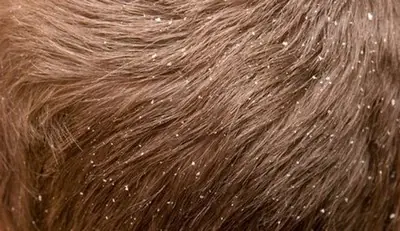
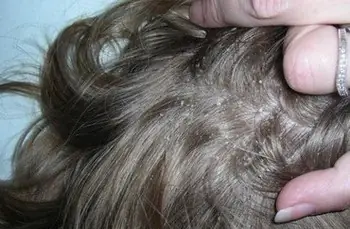
In mild cases, dandruff can be easily treated on its own at home. It is better to treat more complex cases together with a trichologist, and approach this comprehensively and tune in to the duration of the process.
- Dry scalp
Again, improper functioning of the sebaceous glands and some other reasons lead to dry hair and scalp. The glands are actively trying to relieve dryness and protect weakened skin from the negative effects of the environment and thereby cover the entire surface with a layer of sebum. The hair begins to get dirty quickly, a lot of dirt sticks, bacteria and microbes develop strongly. You may mistakenly suspect that you have oily skin and oily hair type. Frequently washing your hair dries out your skin even more, making cracks and scratches itchy. After washing, everything becomes fluffy and electrified, hairs split and break off.
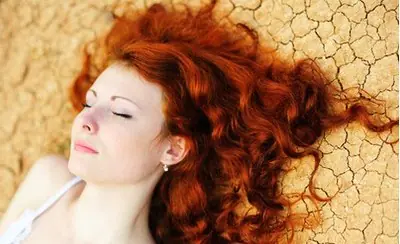
Moisturizing masks, replenishing vitamins and microelements in the body, proper and healthy nutrition, following the rules of washing and drying, and protecting curls from the sun, wind, and frost can cope well with this problem.
- Fungal infection
These are serious diseases that require mandatory treatment. In addition to constant frequency, plaques (lichen) also appear on the skin, which look very repulsive. It is best to undergo a course of treatment in a medical facility under the supervision of a dermatologist, but if for some reason this is not possible, then try to relieve symptoms with tea tree oil wraps and special antifungal shampoos.
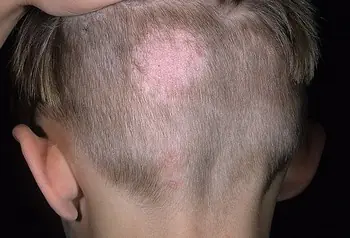
- Parasites (lice, mites...)
Another very serious lesion, which also requires mandatory and immediate treatment (you must visit a dermatologist). Most often these are lice. A louse can jump over anywhere, especially where there are large crowds of people or large groups of employees. You can detect it under a magnifying glass by carefully examining the scalp (it’s better if a doctor does this). It is not possible to detect a tick-borne infection at home.
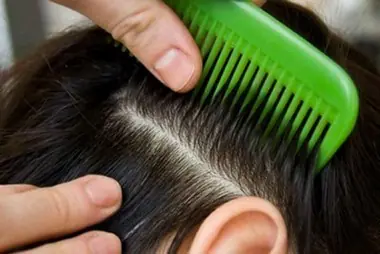
Inspection for lice
Treatment for head lice is quite simple and does not take long. Special shampoos and some folk remedies will do the trick.
Perhaps one of the most common sources of skin itching, and all because recently an incredible number of new allergic reactions have appeared. The main ones are reactions to food. Also, many today are faced with allergies to hair care products (shampoos, balms, masks, styling products...) and decorative cosmetics. It is usually accompanied by rashes, redness, itching, and sometimes swelling.
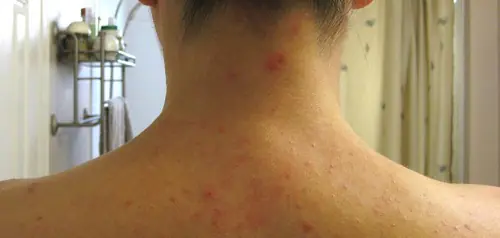
Allergies can also occur when changing your usual hair care product. If returning to the old remedy does not solve the allergy problem, then you should contact a trichologist.
The solution to the problem is to find the allergen and, of course, eliminate it. The best place to do this is at an allergist's office.
- Allergy to paint
This also happens quite often, especially if the artist used low-quality paint or paint containing ammonia or hydrogen peroxide. There is only one way out: be sure to control what exactly the artist paints you with and choose ammonia-free paints or tinted shampoos for coloring. In addition, it is advisable to test for allergic reactions before the procedures.
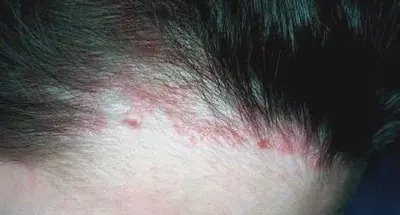
- Allergy to powders
Washing powders and fabric softeners contain many different chemical components. Any of them can cause skin irritation, and, accordingly, allergies and itching.
The source of many different problems with the body is nervous tension, stress, depression, and neuroses. Hair and scalp are also affected. Stress can cause a change in hair type, disruption of the sebaceous glands, spasms of blood vessels, and problems with blood microcirculation. Against this background, metabolism suffers greatly and skin irritation occurs.

To relieve this irritation, first of all, you need to eliminate stressful situations and calm your nerves, take a course of sedatives (prescribed by a neurologist upon treatment), and massage the scalp and cervical spine.
- Poor nutrition
Excessive consumption of sweets, spicy foods, coffee, smoked foods, canned food, etc. These are not very healthy foods and overeating them inevitably affects the skin: dermatitis, eczema, acne, rashes. These skin manifestations are always accompanied by itching and severe scratching of the rash. Coping with this problem is quite simple: eliminate “junk” foods for a while, drink more plain water, consume lean foods with a small amount of spices. Itching and rashes will go away quickly!
- Wrong headdress
Tight and synthetic headgear often causes discomfort on the head. The debate makes the situation even worse. You want to scratch your head all at once and as quickly as possible. There is only one way out - to immediately change the headdress to a more pleasant one, made of natural material, and in addition, different hats should be worn at a certain temperature (hair care in winter) and try not to overheat the scalp, as well as not to overcool.
In addition to these main reasons, there are also secondary ones. These include:
- disturbances in blood circulation;
- gastrointestinal diseases;
- passive lifestyle;
- frequent use of hair dryers and curling irons. ;
- overvoltage .
Of course, there are many reasons and it would take a very long time to describe each one. If your reason is not among the main ones, then it’s worth looking with a specialist for more rare ones. But it is imperative to find the reason why the scalp itches, since this can be a symptom of a serious illness, and going to the hairdresser becomes problematic.
Itchy skin at night is quite common. The problem of itching the body at night not only brings temporary irritation to the person sleeping or trying to sleep, but also leads to loss of sleep. In addition, when the skin on the body itches, there is a desire to eliminate this problem mechanically, which leads to frequent skin damage.
It should be noted that night itching is not a separate disease, but one of the symptoms of another disease. This means that if there is one, it is necessary to carry out a comprehensive diagnosis and find out whether there is a serious pathology in the body. Thus, itching all over the body at night gives reason to think and understand this phenomenon.
Why is itching at night physiologically possible?
Before understanding the reasons why the body itches in different places, it is necessary to understand what contributes to the occurrence of this phenomenon at night. There are several reasons for this:
- At night, body temperature is higher. Usually the whole body is covered with a blanket at this time, which helps maintain body temperature and increase it. This leads to higher skin sensitivity.
- Due to the dilation of blood vessels, blood circulation is significantly enhanced. Because of this, metabolism in the body occurs faster, which leads to a faster release of various substances into the blood. They become the reason why the body itches at night.
- Itching at night is often caused by external irritants. These could be cosmetics, household chemicals, certain clothes and other factors.
- Psychosomatic reaction. This is the influence of some psychological factors on physiological processes. As a result, being alone in the evening, interacting with certain people, watching TV and other events can lead to your whole body itching before going to bed.
Causes of itching
Doctors talk about many factors that cause the body to itch at night. Some of them are the most common, others appear extremely rarely. To diagnose the form of your itching, you need to determine the following:
- is it a chronic itch or a one-time itch;
- itching can be localized or general.
Causes of localized itching
Typically, itching of specific parts of the body is associated with some dermatological disease. If you think that your body itches for no reason, you should understand that in most cases this is not the case. There are specific skin pathologies that cause this problem, namely:
- Dry skin. In winter, when it is cold outside and the humidity is as low as possible, the skin dries out much faster. Due to this, the likelihood of injury increases. More often, micro-sized wounds begin to form, which become infected, causing itching.
- Allergy. Localized itching can be caused by local medications, insects, seasonal flowering plants outside the window, clothing, food, pets, household dust, chemicals, etc., which can cause an allergic reaction.
- Insect bite. When it occurs, toxins enter the skin, causing inflammation. One of the signs is itching.
- Presence of parasites. If your head itches much worse at night, there is reason to think about getting it checked. Pinworms, lice, scabies mites and other parasites are more active at night, which can cause itching to worsen.
- Infectious process in the epidermis, etc.
Why does generalized itching occur?
Many patients suffer from widespread itching in the evening or at night. This may happen for the following reasons:
- liver diseases: hepatitis, hyperbilirubinemia;
- endocrine diseases: diabetes mellitus, thyrotoxicosis;
- oncology;
- neuropsychiatric disorders;
- anemia, polycythemia vera and other blood diseases;
- hereditary xeroderma.
If generalized itching occurs repeatedly, medical attention is required. You should consult a doctor and conduct a complete diagnosis of the body. Sometimes even mild itching can indicate some serious problems in the body that need to be treated immediately.
Cholestasis
Very often the whole body itches at night, but there are no visible signs on the skin. In addition, most internal organs may be fine. In this case, it makes sense to suspect cholestasis. This is a disorder of the metabolism of bile acids, in which their flow into the duodenum is sharply reduced. This leads to the accumulation of bile and products excreted with it in the body, which causes a certain intoxication. Ultimately, cholestasis leads to a number of changes in the body, namely:
- accumulation of bile blood clots;
- bilirubinostasis;
- damage to cell membranes;
- development of sclerosis;
- biliary infarction, etc.
Cholestasis has the following symptoms:
- severe itching of the skin without damage or external visual signs;
- enlarged liver;
- weight loss;
- dry skin;
- pain in the lower back, chest;
- loose stools;
- dark urine;
- brittle bones;
- steatorrhea (colorless stool).
Causes of itchy scalp
Very often, itching is not typical for the entire body, but only for the scalp. The following pathologies may be the cause:
- Pediculosis. Personal hygiene levels have increased significantly compared to past decades, but lice are still occasionally found in society. And if your head itches a lot, there is a reason to check it for parasites.
- Seborrhea. This disease affects the scalp, causing malfunction of the sebaceous glands.
- Diabetes. Patients with this endocrine disease are characterized by dry skin on the head, as a result of which they lose their elasticity. Dandruff develops. Due to poor skin regeneration, it begins to itch.
- Stroke. Itchy skin can occur due to disturbances in the functioning of the brain, which result in improper innervation of the epidermal layers of the skin.
- Pregnancy. The body of pregnant women itches at night as a result of various hormonal changes. They are also the cause of itchy scalp.
Preventing itching at night
There are a number of recommendations that, if followed, can significantly reduce the likelihood of developing itching at night. Firstly, this is personal hygiene. In addition, it is recommended to exclude from the diet foods that can cause allergies, as well as those that cause vasodilation. This could be alcohol, tea, spices, coffee, very hot food.
It is recommended to make your life more measured. You should avoid stress, overexertion, anxiety, and maintain a good mood before bed. Excessive nervous tension can cause severe itching at night.
But the best preventive measure is regular diagnostic procedures that allow you to find out the condition of the body. Thanks to constant medical examinations, it is possible to identify the disease at an early stage and cure it as much as possible.



